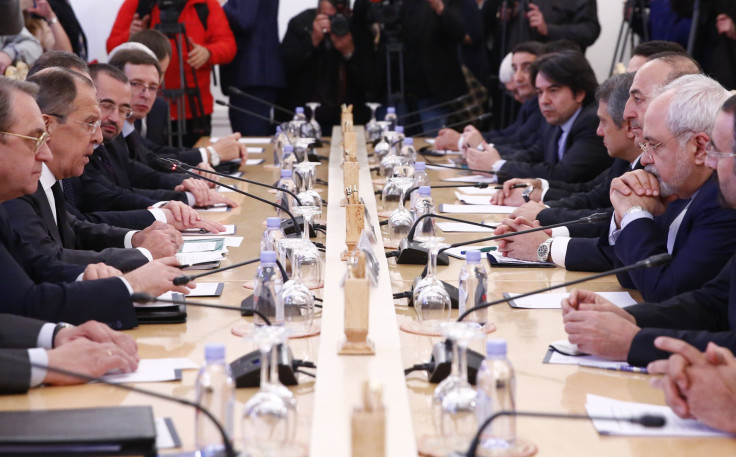When Will The Syrian War End? Russia Makes Peace Deal With Iran And Turkey Called The Moscow Declaration

Russian experts prepared a document detailing a political solution to Syria's civil war as the foreign ministers of Russia, Iran and Turkey met in Moscow on Tuesday. The conference came one day after the Russian ambassador to Turkey was assassinated at an Ankara art gallery by a gunman who referenced the conflict in Syria.
Russia's Sergei Lavrov, Iran's Mohammad Javad Zarif and Turkey's Mevlut Cavusoglu represented the interests of their respective countries in the five-year conflict. Moscow and Tehran back Syrian President Bashar Assad against armed opposition groups, which rose from mass anti-government protests in 2011 and receive Western, Arabian Gulf and Turkish support. The rebels enjoyed significant territorial gains in the early stages of the uprising. However, ideological fractures, a decline in Western sponsorship and the intervention of Iran-backed militias and Russian air power on behalf of the Syrian army helped turned the tides of war.
"All previous attempts by the United States and its partners to agree on coordinated actions were doomed to failure. None of them wielded real influence over the situation on the ground," Russian Defense Minister Sergei Shoigu said, according to Reuters. "The approval of the declaration at the level of defense and foreign ministers implies our readiness to guarantee and jointly address concrete questions related to resolve (the crisis in) Syria."
Assad secured in recent weeks one of his most significant victories yet by regaining control of Aleppo, formerly Syria's commercial capital and largest city. As Syrian troops, Iran-supported paramilitary forces and Russian airstrikes reduced the opposition's grip on the city to its last remaining rebel-held pockets, the international sponsors of both sides of the civil war have come to the table. The unsteady peace has allowed for the ongoing evacuation of civilians from eastern Aleppo, as well as two mostly pro-government, Shiite-majority villages, Foua and Kefraya, under rebel siege in the country's northwest.
Russia and Turkey's involvement in the Aleppo ceasefire was widely considered to be a leading motive for gunman Mert Altintas when he shot dead Russian Ambassador to Turkey Andrei Karlov as he spoke Monday at an art exhibition in Ankara. Altintas, an off-duty Turkish police officer, shouted "Don't forget Aleppo! Don't forget Syria" during the attack as well as "Allahu Akbar," or "God is great" in Arabic.
Turkey has maintained its opposition to Assad throughout the war. However, Ankara has shifted its focus toward fighting Kurds and the Islamic State group, also known as ISIS, both of which are vying for territory near Turkey's border in northern Syria. In August, Turkey launched Operation Euphrates Shield, a direct military intervention on behalf of the Syrian opposition intended to rout nearby Kurdish and ISIS positions.
© Copyright IBTimes 2024. All rights reserved.





















